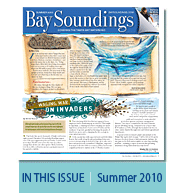 |
||||||||
Editor’s Desk
To paraphrase Charles Dickens, I have the best of jobs and the worst of jobs.
It’s wonderful to be able to work on a story or series of stories for 90 days and to have the space and the direction to follow through on topics that other media might miss.
On the other hand, it’s difficult to edit an environmental publication that doesn’t delve deeply into the BP Deepwater Horizon oil spill and its impact on Florida’s coastline. The story dominates my thoughts, but it’s impossible for a quarterly news journal to cover something that changes practically overnight. Instead, the articles on pages 4 and 5 look at how local organizations are preparing to spring into action if tar balls are about to wash ashore and includes a list of websites where various government agencies post the latest information on the spill.
Across the community, people keep asking what they can do to help. Right now, you can sign up with Keep Pinellas Beautiful. They need volunteers to clean up beaches before the oil arrives so it’s easier to capture if it should reach us. Other organizations – notably the Audubon Society, Clearwater Aquarium, Tampa Bay Watch, Suncoast Seabird Sanctuary and Save our Seabirds – also are recruiting volunteers for other tasks.
The long-term answer must focus on preventing future spills and it’s a little more complicated. As Floridians, we can push to maintain the federal moratorium on oil drilling in the eastern Gulf of Mexico. We can also urge our legislators to require Best Available Technology for preventing future oil spills from wells that are allowed.
And we can all make a difference, no matter what happens in Washington. Electric vehicles (story page 12) use energy more efficiently – plus they limit atmospheric deposition of nitrogen in the bay. Chemical fertilizers are not only made with petroleum (story page 6), they already are causing significant problems in Tampa Bay.
Plain old conservation techniques – like carpooling, raising AC thermostats and using CFLs instead of incandescent light bulbs – can make an enormous difference if enough people turn the current catastrophe in the gulf into a wake-up call and cut back on their personal energy consumption.
— Victoria Parsons
